
Healthcare: Are there health benefits to eating turmeric and other spices?
- Published By Jane Njeri For The Statesman Digital
- 11 months ago
Chilli, turmeric and other spices are often claimed to have health benefits or even the ability to "boost our immune system". But can spices really add any health benefits to our food, or help us ward off illness?
Spices have been a part of our diets for thousands of years – it's second nature to sprinkle our chips with pepper, sip on ginger tea and add chillies to our meals. But recently, some spices have been unofficially promoted from everyday culinary staples to all-healing superfoods.
Hillary Clinton reportedly ate one chilli pepper a day while on the campaign trail in 2016 as an attempt to ward off illness. Turmeric, which has been used in Asia for millennia, has found its way into coffee shops around the world in the form of "golden lattes" – and, during the pandemic, into viral messages that claim it can "boost your immune system" and protect you from getting sick. It’s now, according to one celebrity chef, "everywhere".
Meanwhile, cayenne pepper still hasn’t recovered since the ill-advised "Beyoncé diet" back in 2013, which suggested consuming a concoction of cayenne pepper, maple syrup, lemon and water to lose weight. (Also see our story on whether "boosting" your immune system can really protect you).
But do spices really add any health benefits to our food, or help us ward off illness? And can any of them actually do us harm?
The health benefits of chilli peppers
One of the most well known and widely used spices are chilli peppers. Many studies have examined their potential effects on our health – but have found both beneficial and adverse results.
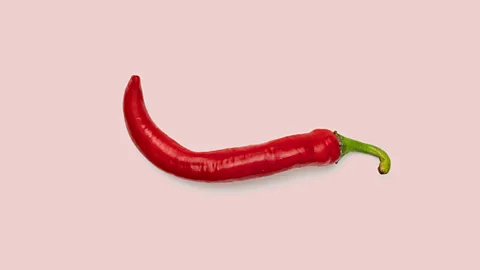 Getty Images
Getty ImagesCapsaicin is the main active ingredient in chillies. When we eat chillies, capsaicin molecules interact with the temperature receptors in our bodies, sending signals to the brain to create the feeling of heat.
Some studies point to the idea that capsaicin may help you live longer.
One 2019 Italian study found that people who ate food seasoned with chilli peppers four times a week had a lower risk of death compared to those who never ate chillies. (Researchers controlled for lifestyle factors including smoking, exercise and overall diet quality.) And in 2015, researchers in China, who examined the chilli consumption and health of nearly 500,000 Chinese adults, found that eating chillies was associated with lower risk of death. Those who consumed spicy foods almost every day had a 14% lower risk of death than those who ate spicy foods less than once a week.
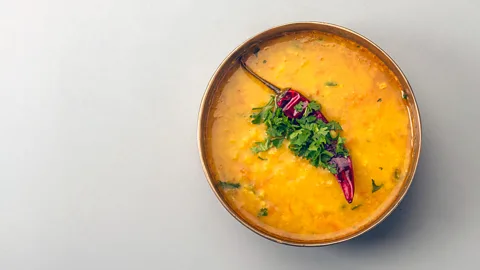 Getty Images
Getty Images"The major findings were that higher intake of spicy foods is related to a lower risk of mortality, particularly deaths due to cancer, heart disease, and respiratory diseases," says researcher Lu Qi, professor of nutrition at Harvard's school of public health.
This does not, however, mean that starting to eat large quantities of chilli peppers will protect your health – or protect you from respiratory illness – in the short-term.
It's important to remember that the China study followed people for a median time of seven years each. So even if chillies had a protective effect on participants’ health, rather than the people who ate chillies happening to be healthier to begin with, the effect likely built up over time – not within weeks or months.
Qi tried to separate the effects of chilli consumption from everything else by controlling for age, sex, education level, marital status, diet and lifestyle factors including alcohol intake, smoking and physical activity. He says the lower risk of disease relating to eating chillies may be partly due to capsaicin.
"Certain ingredients in spicy foods, such as capsaicin, have been found to improve metabolic status, such as lipid profiles" – cholesterol in the blood – "and inflammation, and these may partly account for the observations in our study", says Qi.
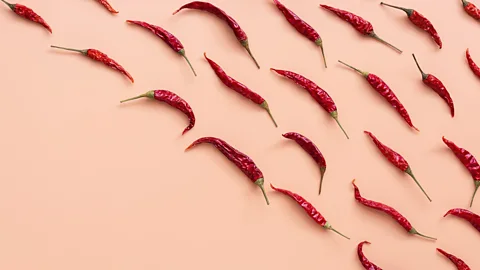 Getty Images
Getty ImagesA number of studies also have shown that capsaicin can increase the amount of energy we burn and can decrease our appetites.
Zumin Shi, associate professor at Qatar University's human nutrition department, has found that chilli consumption is associated with lower risk of obesity and is beneficial for high blood pressure. So when she studied the effects of chilli pepper consumption on cognitive function, she expected a hat trick.
But when she measured Chinese adults' cognitive function against their chilli consumption, she found that people who ate more chillies had poorer cognitive function. This effect was strongest with memory: chilli intake above 50g (1.8oz) per day was associated with almost double the risk of self-reported poor memory. Still, it's worth noting that self-reported data is widely considered unreliable.
The burning sensation that comes with eating chillies has long fascinated scientists. It also gives us some insight into why chillies may be associated with cognitive decline: the sensation is the result of plants evolving to protect themselves against diseases and pests.
"While some plants have evolved to become bitter or spicy to predators, it’s better if the plant can make themselves toxic, too," says Kirsten Brandt, senior lecturer at the Human Nutrition Research Centre Population Health Sciences Institute at the UK's Newcastle University.
But these compounds generally have a smaller effect on us than on insects. "A little bit of toxin can be good, such as caffeine, which speeds up our metabolism so we feel more awake," she says. "However, a lot of it is bad for you."
The compounds that give spices their flavour aren’t harmful to humans, argues Duane Mellor, dietician and senior teaching fellow at Aston Medical School in Birmingham, UK.
"While a lot of the pigments and bitter flavours we tend to enjoy in foods are there to protect plants being eaten by insects, we've grown accustomed to these flavours’ toxicity levels – we can deal with a lot of these plant compounds, including tannins in black tea, whereas some species can't."
On the other hand, even if a compound within a certain spice may have beneficial effects, we normally don’t consume enough of it to make any difference.
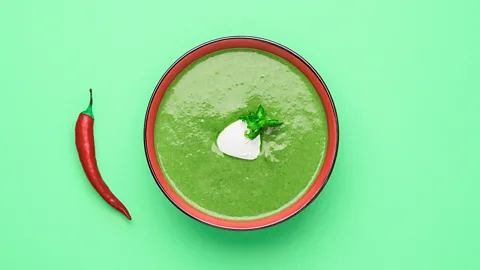 Getty Images
Getty ImagesTake polyphenols: the compounds found in many plants that have anti-inflammatory effects. Spices' health benefits are partly attributed to their high levels of these polyphenols. A 2014 review of research, however, says it's still unclear whether the small amount of these consume when eating spices limits their health benefits.
While some studies have produced encouraging findings, a 2022 analysis of 11 reviews concluded that the health effects of eating capsaicin and spicy food is unclear, nor is the evidence base "extremely high quality".
The health benefits of turmeric
Another popular spice that is widely regarded to have beneficial effects on human health is turmeric. This is widely attributed to curcumin. A small molecule found in turmeric, it is commonly used in alternative medicine to treat inflammation, stress and many other conditions.
Robust evidence for turmeric being beneficial, however, is lacking.
Numerous studies have found curcumin to have anti-cancer effects in the laboratory. But a lab environment is very different to the human body. And researchers say its bioavailability is too low for a normal serving to have any health benefits. This may be the case for other spices, too – although, some researchers have studied the health benefits of supplements that include higher doses of certain spices - and found promising results. For example, a 2023 study found that taking a daily ginger supplement can help to control inflammation in people with autoimmune diseases including lupus and rheumatoid arthritis.
In the Western world, this increasing interest in spices including turmeric as an alternative medicine was last seen in the Middle Ages, when spices were thought to have healing properties, says Paul Freedman, professor of history at Yale University.
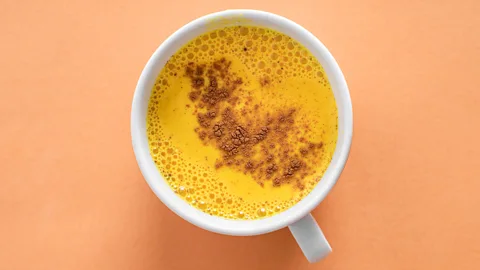 Getty images
Getty images"Spices were used to balance the properties of food. People thought of food as having hot, cold, moist and dry qualities, and they needed balance," says Freedman. Fish was considered cold and wet, for example, while spices were hot and dry.
The idea of using food as medicine, and of balancing out properties like hot and cold or wet and dry, also are main tenets of Ayurvedic medicine, which has been practised in India for thousands of years.
In many Western countries, where such ideas are much newer, "this idea of balance is shared with modern new-age medicine", Freedman says. "Our modern fascination with spices brings us closer to a medieval outlook than 50 years ago – when there was a wall between modern medicine like antibiotics and superstitious medicine of the past that didn’t work."
As part of her job, Kathryn Nelson, former research assistant professor at the University of Minnesota's Institute for Therapeutics Discovery and Development, looked at molecules to see if they could be a compound for new drugs. She decided to study curcumin after she kept coming across the health claims associated with it.
"Researchers are able to exert effects in cells grown in test tubes by adding compounds to it and seeing what happens to the cells," she says.
But she found that curcumin is a "terrible" drug molecule, because it isn’t bio-available – meaning the body can’t make use of it once it's digested. It isn't easily absorbed by the small intestine, and its structure can be modified when it binds with proteins in the small and large intestines. As a result, it doesn't actually do much.
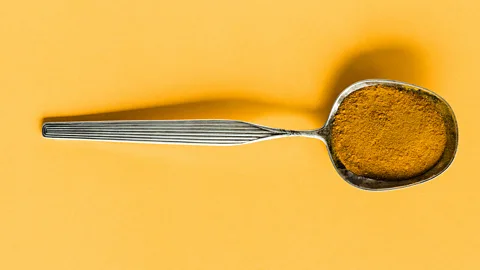 Getty Images
Getty ImagesThere could be something about turmeric that's beneficial, but it’s not curcumin, she says. Plus, if turmeric is cooked as part of a meal, she says, it's added alongside other foods, and heated up, so its chemical components change.
"There might be something else in turmeric worth looking at, but not curcumin, and it might not be one thing. It might need to be chemically modified or added to something to be beneficial."
She says consuming lots of turmeric isn't harmful, but she wouldn't advise using it as self-medication.
Correlation verses causation
Chilli and turmeric have been widely studied, but most trials have only compared data on consumption and different health outcomes, which doesn't separate cause from effect. And research done in laboratories doesn’t necessarily translate to the human body.
And as is true for so many nutritional studies, it's difficult to tease out correlation versus causation.
Take the 2019 Italian study finding that there was a lower risk of death associated with chilli consumption. It was observational, so it's impossible to know whether eating chilli made people live longer, whether already healthy people tend to consume more chilli, or if something else is at work.
One clue could, however, lie in how chillies are consumed by Italians and other Mediterranean cultures, says the study's author Marialaura Bonaccio, epidemiologist at Italy's Mediterranean Neurological Institute.
"Chilli is common in Mediterranean countries," says Bonaccio. "It's mostly eaten with pasta and legumes or vegetables."
 Getty Images
Getty ImagesThis is just one example of how spices could be indirectly beneficial – they're eaten with legumes and vegetables.
Research also has found that adding a spice mix to burgers could potentially lead to fewer free radicals forming in a person's body than those who ate the burger without spices, and could make the meat less carcinogenic. But these benefits could be explained simply by the preservative qualities of the spices, says Mellor, who wasn't involved in the study.
"Putting spices into meat is a well-known technique to preserve meat," he says. "The benefits of spices, therefore, may be more food preservation, rather than them having direct benefits to us. But either way, we could benefit as it still makes the food less harmful to us."
Many researchers believe the health benefits of spices actually come from what we eat them with. For example, there's a tendency to use them to replace salt, says Lipi Roy, clinical assistant professor at the NYU Langone Health medical centre in New York. "Spices make food delicious and flavourful, and they can be a healthier alternative to salt," she says. In fact, last year, researchers proved that replacing salt and saturated fat with spices can actually make popular foods just as palatable.
 Getty Images
Getty ImagesWe also tend to eat chillies with vegetables – which of course benefits our health, too.
So while golden lattes won't do us any harm, we might be better off having some vegetables seasoned with a sprinkling of spices. And we certainly shouldn't rely on them as a way to ward off – or to fight – any kind of illness.
* This article was originally published on 6 April 2020. It was updated on 7 November 2024 to include recent research.
Share on
SHARE YOUR COMMENT
MORE STORIES FOR YOU
Trending Stories
DJ Mo’s former illicit lo...
- Published By Jane
- January 15, 2024
Mapenzi! Zari and Tanasha...
- Published By Jane
- October 24, 2023
Zuchu Speaks on Diamond P...
- Published By Jane
- October 12, 2023
Hio Ni Upumbavu Wasituche...
- Published By Jane
- November 8, 2023
RECOMMENDED FOR YOU
How People are Using AI t...
- Published By The
- October 29, 2025
How Raila Odinga’s Death...
- Published By The
- October 29, 2025
What is Ayurveda? Raila O...
- Published By The
- October 29, 2025
Why Parents Should Spend...
- Published By The
- October 29, 2025
Latest Stories
Is It Really Love At Firs...
- Published By Jedida
- November 4, 2025
What Are Chia Seeds and H...
- Published By Jedida
- November 4, 2025
Little Known Garden Herb...
- Published By Jedida
- November 4, 2025
Former US Vice President...
- Published By Jedida
- November 4, 2025



